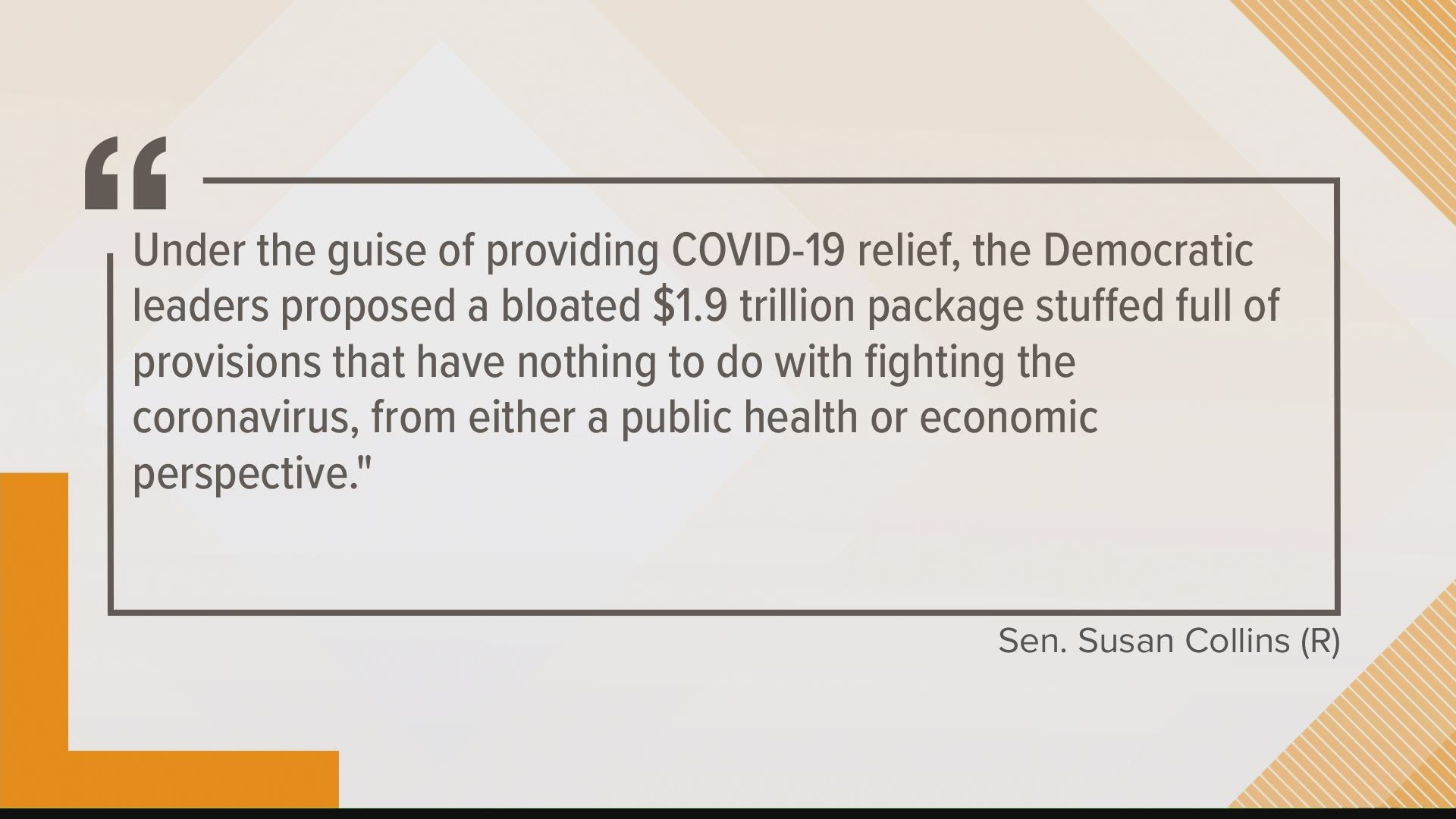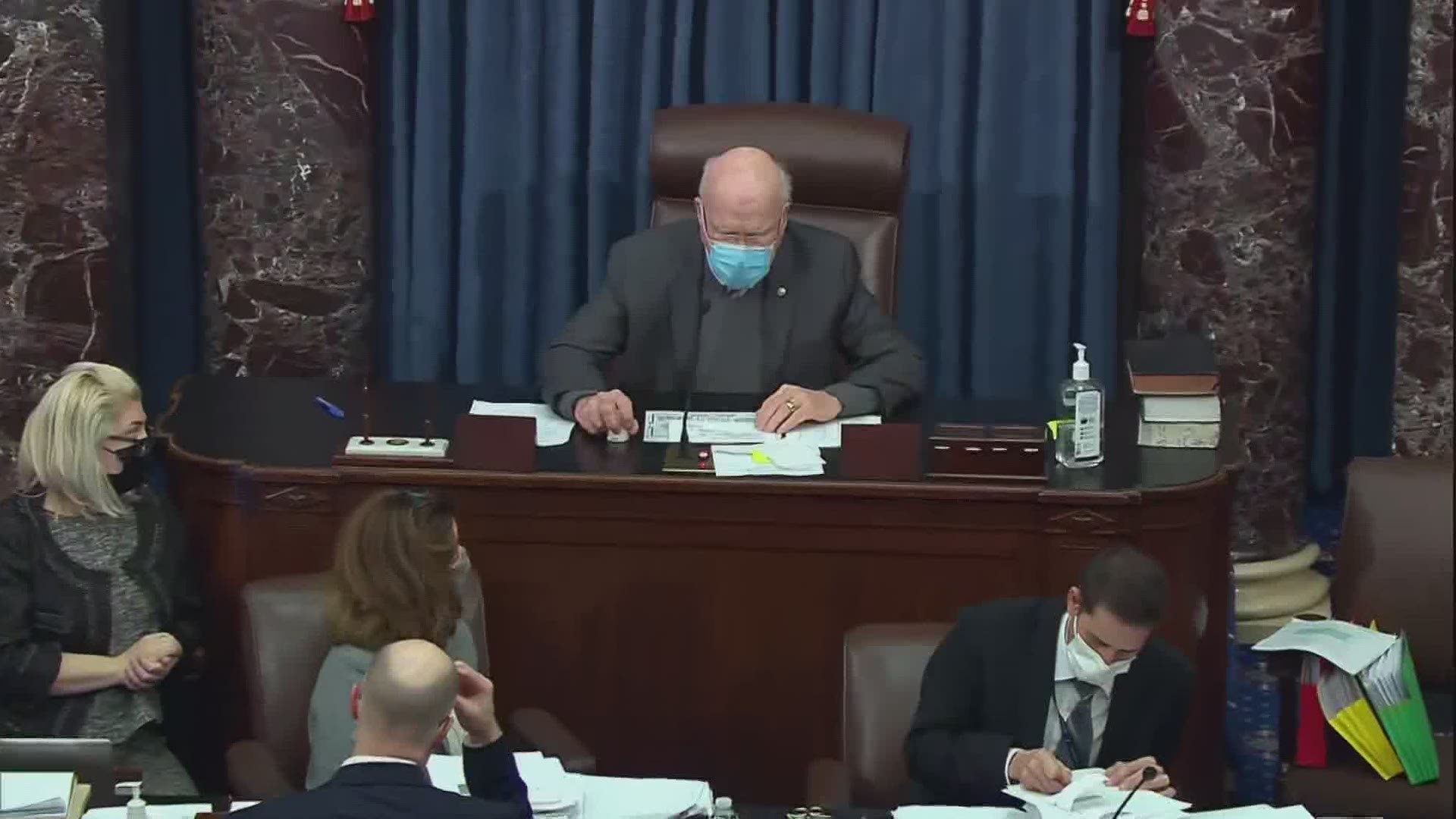WASHINGTON, D.C., USA — President Biden's $1.9 trillion COVID-19 relief bill passed a vote Saturday as Democrats prevailed in a divided Senate. The House is now on track for final passage of the major economic assistance package next week.
The Senate worked through the night and past sunrise Saturday on the Democrats' showpiece $1.9 trillion COVID-19 relief bill after a deal between leaders and moderate Sen. Joe Manchin on emergency jobless benefits broke a logjam that had stalled the package.
The compromise, announced by Manchin, D-W.Va., and a Democratic aide late Friday and backed by President Joe Biden, cleared the way for the Senate to begin a marathon series of votes on amendments before eventual approval of the sweeping legislation. The bill then would return to the House, which was expected to give it final congressional approval and send it to Biden to sign.
Maine's senators were split, with Independent Angus King voting in favor of the bill and Republican Susan Collins voting against it.
“In the face of this crisis, the previous Senate leadership did not do enough – despite bipartisan support for action. The bill the Senate passed today, and the vote I proudly cast in favor, confronts the damage done across the board," King said in a statement following the vote. "This legislation will help us save lives and repair the economic damage inflicted by this pandemic. This legislation is expensive – but as we’ve seen over the last year, the cost of inaction is even higher."
Collins was among a group of 11 Republican senators who introduced a $650 billion COVID-19 relief plan as a substitute amendment to the $1.9 trillion budget reconciliation bill. The amendment, which was built on the COVID-19 relief plan that was unveiled last month by a group of Republican senators, was not adopted by a vote of 48-51.
“Regrettably, there was no interest from Democratic Leadership in negotiating a targeted, bipartisan relief package that meets the challenges at hand. Instead, Democrats chose to ram through a partisan bill using a partisan process. The only thing bipartisan about this package was the opposition in the House," Collins said in a statement following the vote. "Under the guise of providing COVID-19 relief, the Democratic leaders proposed a bloated $1.9 trillion package stuffed full of provisions that have nothing to do with fighting the coronavirus, from either a public health or economic perspective. The bill also picks winners and losers. For instance, rather than allocating state aid based on population size as Congress did previously, a new formula will result in a cut of $155 million for the State of Maine."
Full statements from King and Collins are included below.
Biden’s foremost legislative priority is aimed at battling the killer pandemic and nursing the economy back to health. It would provide direct payments of up to $1,400 to most Americans and money for COVID-19 vaccines and testing, aid to state and local governments, help for schools and the airline industry and subsidies for health insurance.
In both versions of the bill, individual tax filers making up to $75,000 per year will get $1,400. Couples making up to $150,000 will get $2,800. There will also be $1,400 tacked on for each dependent in the household.
In the House version that was passed, the money paid out phases to zero at $100,000 income for individuals and $200,000 for couples. But in the Senate version, it phased out at $80,000 and $160,000, respectively.
Because of those changes and other amendments in the Senate version of the bill, the plan goes back to the House. Representatives must vote on the Senate version or the two chambers may hold a conference to come to some middle ground.
Roughly 8 million fewer households will get a check under the Senate bill compared with what the House passed, according to an analysis from the Tax Policy Center.
Democrats and Biden want to have the COVID-19 relief plan approved by Sunday, March 14. That's when extra unemployment assistance and other pandemic aid expires. Whether that will happen by that date depends on how quickly the House can vote and possibly pass it. That is expected to happen next week.
King's full statement:
“Over the last year, America has been devastated by COVID-19 – costing a half a million lives, and testing our nation on every front imaginable. Beyond the clear human cost, this pandemic has stressed our personal finances, shuttered our shops, strained our local economies and governments, and relentlessly stretched our medical professionals and first responders to and beyond their breaking points.
“In the face of this crisis, the previous Senate leadership did not do enough – despite bipartisan support for action. The bill the Senate passed today, and the vote I proudly cast in favor, confronts the damage done across the board. This legislation will help us save lives and repair the economic damage inflicted by this pandemic. This legislation is expensive – but as we’ve seen over the last year, the cost of inaction is even higher.
“The COVID relief bill includes $160 billion in essential funding to address the ongoing public health emergency, ensuring we have the resources needed to control this virus and vaccinate the American people. These investments in our healthcare system are vital – but they are only one piece of the work that must be done to repair the damage caused by this pandemic. You may have heard the charge that ‘only 9% of this bill relates to COVID, and the rest is some kind of political wish list.’ This is flat wrong and deliberately misleading. This legislation will also address the secondary effects of COVID-19 – including delivering desperately-needed financial support to working families through targeted direct payments, extending unemployment benefits, and providing additional resources to help school districts safely reopen. The bill also addresses longstanding inequalities exacerbated by the coronavirus pandemic by adjusting Child Tax Credit to help lift 10,000 Maine children out of poverty and investing key resources into broadband expansion, which is essential to remote learning, telehealth for seniors, and working from home – all crucial in our fight against the impacts of the pandemic.
“Over the last several weeks, I have worked hard with my colleagues and the White House to strengthen and streamline this bill, improving its focus on need and removing many of the unrelated expenses that were a weakness of the House bill that passed last week. The result is a well-thought-out, effective piece of legislation that has broad, bipartisan support from the American public – one recent poll shows that 77% of the American public supports this plan, including 6 in 10 Republicans.
“At the end of the day, I worked hard on this bill and voted for it because Maine people need help. This bill will meet their need, and set us on the path to putting this dark chapter of American history behind us once and for all.”
Collins' full statement:
“In the past year, Congress has taken unprecedented, bipartisan action to confront the effects of the pandemic. We passed five COVID-19 relief bills with overwhelming margins, providing $4 trillion in urgently needed relief to the American people. The most recent package, which provided $900 billion, was signed into law just over two months ago. Hundreds of billions of dollars of aid remains unspent.
“There is widespread support in Congress to pass a sixth package to increase funding for the distribution of the vaccine and to help struggling families, workers, small business owners, and health care providers. I led a group of 11 Republican Senators in proposing a targeted $650 billion bill that would have done just that. Among other provisions, our amendment would have supported rural health care providers, helped students return to their classrooms, extended unemployment assistance, sent direct $1400 checks to low- and middle-income Americans, expanded access to child care, increased resources for substance use and mental health, bolstered nutrition assistance programs, and sustained small businesses and jobs across the country.
“Regrettably, there was no interest from Democratic Leadership in negotiating a targeted, bipartisan relief package that meets the challenges at hand. Instead, Democrats chose to ram through a partisan bill using a partisan process. The only thing bipartisan about this package was the opposition in the House. Under the guise of providing COVID-19 relief, the Democratic leaders proposed a bloated $1.9 trillion package stuffed full of provisions that have nothing to do with fighting the coronavirus, from either a public health or economic perspective. The bill also picks winners and losers. For instance, rather than allocating state aid based on population size as Congress did previously, a new formula will result in a cut of $155 million for the State of Maine.
“Key economic indicators highlight how wasteful and unnecessary the excessive spending unrelated to COVID-19 is. According to the Congressional Budget Office, the U.S. economy is currently between $600 billion and $700 billion below where it should be, suggesting that a package of $650 billion is the appropriate size. That is exactly what I offered. Moreover, on February 1, the CBO projected that the U.S. economy would return to its pre-pandemic size by the middle of this year—and that was before the arrival of a third COVID-19 vaccine and an accelerated vaccination timeline. Just this week, the Department of Labor reported that the American economy added a robust 379,000 jobs in February as states reopen and more people receive the vaccine. And one of President Obama’s former chief economic advisors warned that a stimulus package on the scale of $1.9 trillion risks triggering inflation and financial instability.
“During previous major crises, Members of Congress have been able to set aside their ideological differences, just as we did when we passed five COVID-19 relief packages last year. Our country is at its best when we come together as Americans to overcome the challenges we face. I stand ready to work with my colleagues on both sides of the aisle as we work to recover from the pandemic and address other pressing issues.”


